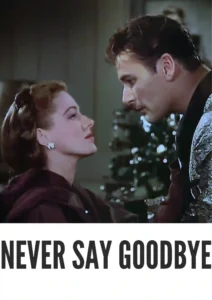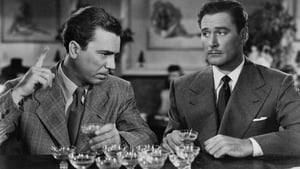Contact: [email protected]
Video Sources 0 Views
- Watch trailer
- Never Say Goodbye


Never Say Goodbye 1946 First Early Colored Films Version
Synopsis
Table of Contents
ToggleReview: Never Say Goodbye (1946) – A Heartfelt Romantic Comedy

Introduction
Never Say Goodbye, released in 1946, is a delightful romantic comedy directed by James V. Kern. Renowned for its charming storyline, witty dialogue, and stellar performances, this classic film continues to enchant audiences with its timeless exploration of love, laughter, and second chances. In this review, we’ll delve into the heartwarming world of Never Say Goodbye and its enduring appeal in the realm of romantic cinema.
Check The Full Colorized Movies List
Check Our Colorized Movies Trailer Channel
Understanding Never Say Goodbye (1946): Director, Cast, and Genre
Directed by James V. Kern, Never Say Goodbye features a talented cast led by Errol Flynn and Eleanor Parker. The film belongs to the romantic comedy genre, known for its light-hearted tone, playful banter, and heartwarming moments.
Exploring the World of Never Say Goodbye (1946): Plot and Characters
Never Say Goodbye follows the story of Phil and Ellen Gayley, a divorced couple who find themselves entangled in a series of comedic misadventures when their daughter runs away to join the circus. As Phil and Ellen navigate the ups and downs of co-parenting, old feelings are reignited, leading to a rekindling of their romance amidst the chaos of circus life.
The Art of Film Colorization
While Never Say Goodbye was originally filmed in black and white, its early colorized version adds a new layer of vibrancy to its charming visuals. The colorization process enhances the film’s romantic atmosphere and captures the beauty of its idyllic settings with striking clarity.
Early Colored Films: A Brief History
The history of early colored films is marked by innovation and experimentation as filmmakers sought to enhance the visual appeal of their movies. From hand-tinted frames to pioneering technicolor processes, the evolution of colorization techniques transformed the cinematic landscape, offering audiences a new way to experience the romance and comedy of classic Hollywood cinema.
Never Say Goodbye (1946) and Its Early Colored Version
The decision to release Never Say Goodbye in a colorized format was made with the intention of immersing audiences in the romantic splendor of its idyllic settings and enhancing the film’s visual appeal. While some purists may prefer the original black and white version, the early colorized edition of Never Say Goodbye adds a new layer of vibrancy to its charming visuals and captures the timeless romance of its story with breathtaking clarity.
The Debate Over Film Colorization
The debate over film colorization continues to divide audiences and industry professionals alike. While some argue that colorization breathes new life into classic films and makes them more accessible to modern audiences, others maintain that it compromises the artistic integrity of the original work. As technology advances and filmmaking techniques evolve, the debate over colorization remains a topic of ongoing discussion within the film community.
Examining Never Say Goodbye (1946) as an Early Colored Film
Viewing Never Say Goodbye in its early colorized iteration offers audiences a fresh perspective on its charming romance and comedic hijinks. The colorization process enhances the film’s romantic atmosphere and captures the beauty of its idyllic settings with stunning clarity. As viewers are swept away by the chemistry between Phil and Ellen, they are treated to a visual feast that immerses them in the timeless romance of classic Hollywood cinema.
Influence and Legacy: Never Say Goodbye (1946)’s Impact on Cinema
Never Say Goodbye is widely regarded as a classic of the romantic comedy genre that continues to enchant audiences with its charming storyline and endearing characters. Its exploration of themes such as love, laughter, and second chances resonates with viewers of all ages, making it a timeless favorite that continues to influence filmmakers and inspire new generations of cinephiles.
Director’s Cinematic Legacy: Beyond Never Say Goodbye (1946)
James V. Kern’s directorial legacy extends far beyond Never Say Goodbye, encompassing a diverse body of work that includes acclaimed films such as The Paleface and Francis Goes to the Races. As one of the most talented directors of his generation, Kern was known for his ability to craft entertaining narratives that captured the hearts of audiences around the world. Never Say Goodbye stands as a testament to his talent and creativity, solidifying his reputation as one of the great auteurs of classic Hollywood cinema.
Themes Explored in Never Say Goodbye (1946)
At its core, Never Say Goodbye explores themes of love, laughter, and second chances in the context of a charming romantic comedy. Through its witty dialogue and endearing characters, the film offers a heartwarming portrayal of the human experience, reminding viewers of the power of love to overcome obstacles and bring joy into their lives.
Reception and Controversy Surrounding Never Say Goodbye (1946)
Upon its release, Never Say Goodbye received widespread critical acclaim for its charming storyline, witty dialogue, and stellar performances. While the decision to release the film in a colorized format sparked debate among purists, its enduring popularity has cemented its status as a timeless classic of the romantic comedy genre.
Where to Watch Never Say Goodbye (1946) Online
For those eager to experience Never Say Goodbye for themselves, the film is readily available on popular streaming platforms such as Amazon Prime Video, Google Play Movies, and iTunes. Whether viewed in its original black and white format or its early colorized iteration, Never Say Goodbye offers a cinematic experience that is both charming and visually stunning.
FAQs About Never Say Goodbye (1946)
1. Is Never Say Goodbye based on a true story?
No, Never Say Goodbye is a fictional romantic comedy that explores the ups and downs of love and second chances in the context of a charming storyline. While the film’s narrative may draw inspiration from real-life experiences, its characters and plot are works of fiction.
2. Who starred in Never Say Goodbye?
Never Say Goodbye stars Errol Flynn in the role of Phil Gayley, a charming and witty man who finds himself entangled in a series of comedic misadventures when his daughter runs away to join the circus. He is supported by Eleanor Parker, who delivers a memorable performance as his ex-wife, Ellen.
3. What is the central message of Never Say Goodbye?
At its core, Never Say Goodbye explores the power of love and second chances to bring joy into our lives, even in the face of adversity. Through its charming storyline and endearing characters, the film reminds viewers of the importance of cherishing the moments we have with the ones we love and never giving up on the possibility of happiness.
4. Why was Never Say Goodbye released in a colorized format?
The decision to release Never Say Goodbye in a colorized format was made with the intention of enhancing the film’s visual appeal and immersing audiences in the romantic splendor of its idyllic settings. While some purists may prefer the original black and white version, the early colorized edition of Never Say Goodbye adds a new layer of vibrancy to its charming visuals and captures the timeless romance of its story with breathtaking clarity.
5. What is the legacy of Never Say Goodbye?
Never Say Goodbye is widely regarded as a classic of the romantic comedy genre that continues to enchant audiences with its charming storyline and endearing characters. Its exploration of themes such as love, laughter, and second chances resonates with viewers of all ages, making it a timeless favorite that continues to influence filmmakers and inspire new generations of cinephiles.
6. Are there any sequels or remakes of Never Say Goodbye?
No, there have been no official sequels or remakes of Never Say Goodbye. However, the film’s enduring popularity has inspired countless reinterpretations and homages in various media. Nonetheless, none have captured the charm and wit of the original 1946 classic.
7. Where can I watch Never Say Goodbye online?
For those eager to experience Never Say Goodbye for themselves, the film is readily available on popular streaming platforms such as Amazon Prime Video, Google Play Movies, and iTunes. Whether viewed in its original black and white format or its early colorized iteration, Never Say Goodbye offers a cinematic experience that is both charming and visually stunning.
Conclusion
In conclusion, Never Say Goodbye (1946) stands as a timeless classic of the romantic comedy genre that continues to enchant audiences with its charming storyline, witty dialogue, and endearing characters. Whether viewed in its original black and white format or its early colorized iteration, James V. Kern’s insightful direction and the stellar performances of the cast offer a cinematic experience that is both heartwarming and visually stunning. As viewers are swept away by the romantic adventures of Phil and Ellen, they are reminded of the power of love and second chances to bring joy into our lives, even in the most unexpected of circumstances. Never Say Goodbye remains a timeless favorite that continues to captivate and inspire audiences around the world.











